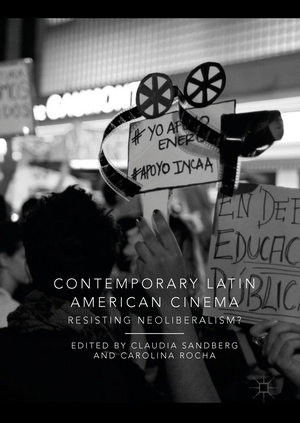Contemporary Latin American Cinema: Resisting Neoliberalism?
Editat de Claudia Sandberg, Carolina Rochaen Limba Engleză Hardback – 6 aug 2018
| Toate formatele și edițiile | Preț | Express |
|---|---|---|
| Paperback (1) | 525.20 lei 38-44 zile | |
| Springer International Publishing – 14 dec 2018 | 525.20 lei 38-44 zile | |
| Hardback (1) | 788.72 lei 6-8 săpt. | |
| Springer International Publishing – 6 aug 2018 | 788.72 lei 6-8 săpt. |
Preț: 788.72 lei
Preț vechi: 961.85 lei
-18% Nou
Puncte Express: 1183
Preț estimativ în valută:
150.94€ • 157.00$ • 124.61£
150.94€ • 157.00$ • 124.61£
Carte tipărită la comandă
Livrare economică 14-28 aprilie
Preluare comenzi: 021 569.72.76
Specificații
ISBN-13: 9783319770093
ISBN-10: 3319770098
Pagini: 351
Ilustrații: XIX, 278 p. 8 illus., 7 illus. in color.
Dimensiuni: 148 x 210 mm
Greutate: 0.64 kg
Ediția:1st ed. 2018
Editura: Springer International Publishing
Colecția Palgrave Macmillan
Locul publicării:Cham, Switzerland
ISBN-10: 3319770098
Pagini: 351
Ilustrații: XIX, 278 p. 8 illus., 7 illus. in color.
Dimensiuni: 148 x 210 mm
Greutate: 0.64 kg
Ediția:1st ed. 2018
Editura: Springer International Publishing
Colecția Palgrave Macmillan
Locul publicării:Cham, Switzerland
Cuprins
1. Contemporary Latin American Cinema and Resistance to Neoliberalism: Mapping the Field (Claudia Sandberg).- 2. Southern Hegemonies and Metaphors of the Global South in También la Lluvia (Alfredo Martínez-Expósito).- 3. Neoliberal Masculinities in Contemporary Peruvian Cinema: Octubre and El limpiador (Rosana Díaz-Zambrana).- 4. New Geographies of Class in Mexican and Brazilian Cinemas: Post Tenebras Lux and Que horas ela volta? (María Mercedes Vázquez Vázquez).- 5. Paraíso ¿Cuánto pesa el amor?: Challenging the Neoliberal in Mexican Cinema (Niamh Thornton).- 6. Güeros: Social Fragmentation, Political Agency, and the Mexican Film Industry under Neoliberalism (Jacobo Asse Dayán).- 7. Negotiating Neoliberal Demands on Contemporary Cinema: The Role and Influence of the Socially Committed Film Producer in Peru (Sarah Barrow).- 8. Larraín’s No: A Tale of Neoliberalism (María Paz Peirano).- 9. Crowdfunding Images of Colombia and Ecuador: International Collaborations and Transnational Circulation in a Neoliberal Context (Carolina Rocha).- 10. Argentine Cinema in the Age of Digitization: Between Foreign Dominance and Discussion of Benefits (Andrea Morán and Miguel Fernández Labayen).- 11. Social Cinema in Neoliberal Times: The Macabre Baroque in the Films of Pablo Larraín (Walescka Pino-Ojeda).- 12. Between Armed Conflict, Social Awareness, and the Neoliberal Market: The Case of Alias María (Carlos de Oro).- 13. Maximiliano Schonfeld’s Films of the Volga Germans in Entre Ríos: About the Neoliberal Devil in Argentine Cinema (Claudia Sandberg).- 14. Community Film in Southern Greater Buenos Aires: Emerging Voices and the Economy of Film as Resistance to Neoliberalism (Andrea Molfetta).
Notă biografică
Claudia Sandberg is a filmmaker and Senior Research and Teaching Fellow at the University of Melbourne, Australia. Her research is concerned with relations between European and Latin American cinemas. Sandberg co-directed Peliculas Escondidas (2016), a documentary about Chilean émigré artists in East Germany, and is co-editor of The German Cinema Book 2 (2018).
Carolina Rocha is Professor of Spanish at Southern Illinois University Edwardsville, USA. She specializes in contemporary Latin American cinema. She is author of Argentine Cinema and National Identity (1966-1976) (2017) and Masculinities in Contemporary Argentine Popular Cinema (2012), and editor of Modern Argentine Masculinities (2013) and several other volumes about Latin American film.
Carolina Rocha is Professor of Spanish at Southern Illinois University Edwardsville, USA. She specializes in contemporary Latin American cinema. She is author of Argentine Cinema and National Identity (1966-1976) (2017) and Masculinities in Contemporary Argentine Popular Cinema (2012), and editor of Modern Argentine Masculinities (2013) and several other volumes about Latin American film.
Caracteristici
The first volume to examine the relation between Latin American film and neoliberalism in a comprehensive form Includes investigations from emerging and eminent film scholars from a global context as it specifically relates to Latin American cultural production Traces the impact of neoliberalism from the late twentieth century up to the current moment
